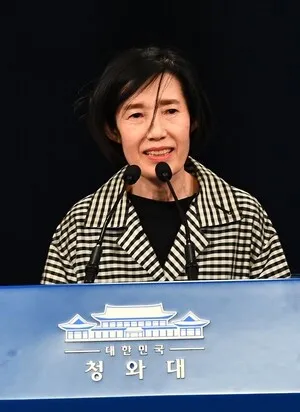hankyoreh
Links to other country sites 다른 나라 사이트 링크
S. Korea’s first-ever female helicopter pilot appointed Minister of Veterans Affairs

President Moon Jae-in’s appointment of Pi Woo-jin, 61, a lieutenant colonel in the army reserves, as Minister of Patriots and Veterans Affairs on May 17 is remarkable for a number of reasons. It’s unprecedented for a female field officer in the reserves with progressive tendencies to be appointed to lead the Ministry, which has typically been directed by conservative male generals in the reserves. Pi is the first female Minister of Patriots and Veterans Affairs since the Ministry was established in 1961. It’s also noteworthy that the new minister’s appointment was announced one day before the memorial service for the 37th anniversary of the Gwangju Democratization Movement on May 18, an event that is organized by the Ministry.
Born in Chungju, North Chungcheong Province, Pi graduated from Cheongju University with a degree in physical education and was commissioned as a second lieutenant in the army in 1979. After commanding a company in the Special Forces, Pi served as the army’s first female helicopter pilot. “In a career that is even challenging for male soldiers, Pi shattered the glass ceiling through her own strength and blazed the trail for woman,” the Blue House said.
Pi’s military career was jeopardized when she was diagnosed with breast cancer in 2002. She returned to health after a mastectomy and chemotherapy, but the military forcibly discharged her in Nov. 2006, applying a regulation in the military legal code that mandates automatic retirement for soldiers who have lost a body part. Pi filed a lawsuit to be reinstated to the army, and after a legal battle that lasted for one year and seven months, she returned to active service in May 2008. While she was fighting her legal battle with the Defense Ministry, she also ran as a proportional representative candidate for the New Progressive Party in the 2008 general election. After rejoining the army, Pi directed the department of doctrinal development at the Army Aviation School in Nonsan, concluding a military career that lasted for more than 30 years at the standard retirement age for her rank in Sep. 2009.
Since 2015, Pi has been a non-permanent expert member of the National Human Rights Commission, and on Apr. 25, she gained attention by issuing a statement supporting Moon’s bid for presidency along with female soldiers in the army reserves, speaking as president of the Young Women Soldiers’ Forum. This was the first time in the 67-year history of female soldiers in the reserves to declare their support for a particular candidate. In Pi’s declaration of support, she emphasized that “security without people is false security.”
“Taking care of our veterans is the past and future of security. These days, I understand that veterans‘ families feel somewhat neglected and are really worried that they’re being forgotten. In the future, I will implement veteran policies that are focused on veterans’ families,” said Pi on May 17. When asked whether “March for the Beloved” would be sung during the memorial service in Gwangju on May 18, Pi said that both the national anthem and “March for the Beloved” would be “sung energetically.”
“The Ministry of Patriots and Veterans Affairs has failed to unify South Koreans’ hearts until now. We hope the appointment of a new minister who has demonstrated the meaning of patriotism with her whole body will bring the Ministry closer to Koreans,” said a key official at the Blue House.
On May 11, the day after his inauguration, Moon dismissed Minister Park Seung-chun and gave orders the following day for the “March for the Beloved” to be sung in unison during the Gwangju May 18 memorial ceremony. Park was appointed as Minister in Feb. 2011, during the presidency of Lee Myung-bak (2008-13), and remained in that post for six years and three months. During his time in office, Park concentrated on providing security education to the public, which he dubbed “education in patriotism,” provoking sharp criticism that he was neglecting the Ministry‘s original purpose.
By Jung In-hwan, staff reporter
Please direct questions or comments to [english@hani.co.kr]

Editorial・opinion
![[Column] Trump’s kingdom, Xi’s empire [Column] Trump’s kingdom, Xi’s empire](https://flexible.img.hani.co.kr/flexible/normal/500/300/imgdb/original/2025/1114/521763110114087.jpg) [Column] Trump’s kingdom, Xi’s empire
[Column] Trump’s kingdom, Xi’s empire![[Column] Putting the ‘demos’ back in democracy [Column] Putting the ‘demos’ back in democracy](https://flexible.img.hani.co.kr/flexible/normal/500/300/imgdb/original/2025/1112/4417629374603509.jpg) [Column] Putting the ‘demos’ back in democracy
[Column] Putting the ‘demos’ back in democracy- [Editorial] Prosecutors’ selective outrage is self-incriminating
- [Column] Korea’s ‘republic of lawyers’ is only making things worse
- [Column] Trump should win Nobel War Prize
- [Editorial] Boozing, luxe gifts, playing royalty: Yoon and Kim must pay for privatizing power
- [Column] Korea’s young men need liberating too
- [Correspondent’s column] Yet another fragmented Sado mine memorial
- [Column] Why is South Korea clamoring for yesterday’s nuclear submarines?
- [Column] The banality of Korea’s ‘democratic fascism’
Most viewed articles
- 1Forget their hiatus — can NewJeans survive their comeback?
- 2[Exclusive] Months before martial law, Yoon alluded to siccing military on lawmakers
- 3South Korea, US release fact sheet on deals, including support for uranium enrichment
- 4Lee’s approval rating rises to 61% despite uproar over Daejang corruption case
- 5[Column] Trump’s kingdom, Xi’s empire
- 6[Photo] Korea cheers on half a million students sitting college entrance exam
- 7[K-pop: To Love or Let Go] Is chart obsession ruining K-pop?
- 8How did Asians go from being called “white” to “yellow”
- 9Real-life heroes of “A Taxi Driver” pass away without having reunited
- 10New documentary refutes “comfort women” disinformation at the source